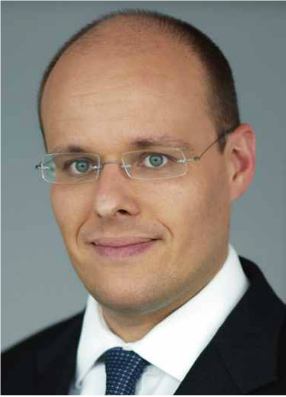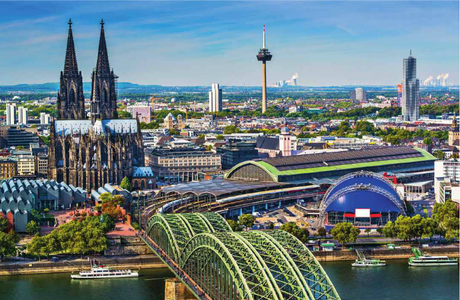Discussing interest rates and blue chip opportunities with Ludwig Palm of Flossbach von Storch
|
Located away from the financial hubbub of Frankfurt, Cologne-based Flossbach von Storch manages roughly €23 bn ($26 bn) for private and institutional clients, with two thirds invested in listed equities. IR Magazine recently sat down with Ludwig Palm, who manages the Dividend Fund and co-manages the Fundament Fund, to discuss living in a low interest-rate world, the wisdom of Charlie Munger – and why blue chips have the edge over small caps. |
Flossbach von Storch has €23 bn in assets under management. Is that all managed from Cologne?
Yes. The co-founders (both ex-Goldman Sachs) wanted to be away from the ‘noise’ of Frankfurt. We get the information we need here in Cologne; it helps when you are investing for the long term to be away from the noise.
 Ludwig Palm: 'We take valuation into consideration but our style is quality-based' |
What’s the asset and geographic split of that €23 bn?
Currently, it holds around 65 percent (€15 bn) in equities, split as follows: 55 percent US, 15 percent continental Europe and a further 15 percent Switzerland, 5 percent each the UK and Japan, and the remaining 5 percent the rest of the world.
How many investment professionals are employed at Flossbach von Storch?
There are 32 in all. We have some sector allocation among our analysts but we make sure everybody gets a perspective across sectors. I am a generalist: as a fund manager, you need to know something about every sector.
Everybody is global but we have a separate emerging markets team that runs an emerging markets fund and gives us some input for the global mandates. The world is global: China and India depend on the US and vice versa, as does Europe.
Sectors also merge. Look at the retail space: it is heavily affected by technology, as are banking and finance. You can think of us as individual portfolio managers and analysts but everybody works together. Being a small team is one of our advantages. We all sit on the same floor so the information flow works well.
What is the firm’s investment style?
Risk/reward across asset classes and within the asset class. We take a world view. For example, we believe interest rates will remain low for a long time because both government debt and debt around the world are too high, so central banks will keep interest rates low. This brings us to equities and within equities we have a quality bucket. We believe, like Charlie Munger, that it’s better to buy a great business at a fair price than a fair business at a great price so we take valuation into consideration but our style is quality-biased. Growth for us is part of the value.
Which benchmarks do you use?
For global equity funds, we use the MSCI World Index. But when we build a portfolio, we start with a blank sheet, we don’t think about the benchmark. We build it from the bottom up and think about good companies and whether the price we pay is fair. Then we look top-down to see whether we have some balance between regions and sectors, so we are independent of the benchmark.
What’s your active share ratio?
It’s likely to be high. I know the top positions in the MSCI World Index but for my portfolio it doesn’t matter at all. We own stakes in companies like Apple and Microsoft and many of the blue chips but that’s not because they have a high weighting in the benchmark. It’s because we think risk/reward is good for those companies at the moment. We currently feel some of the small caps are a bit overvalued and the market is paying very high prices for them. When the next crisis comes, if small-cap prices crash and the risk/reward is right, we will be ready to buy them. But at the moment we believe risk/reward for blue chips is better.
Do you have a target price when you buy a stock?
Not really. What we tend to look for is quality at a price that makes sense. We look at certain quantitative factors like return on capital, balance sheet and growth profile. But qualitative factors are more important as everyone can focus on quantitative factors on Bloomberg.
The qualitative factors include whether the company has an economic moat [a strong competitive advantage] and how big it is, what the business model is and whether it is sustainable. We look at management teams: are they honest and capable of managing the business? We then grade the company and this grade gives us a required return. It’s just like when you buy a bond: if the issuer of the bond has low credibility, you want to have a higher yield, and vice versa.
We then estimate the free cash flows for the next 10 years, take the average and divide it by the enterprise value, which gives a free cash flow yield. We compare this with our required yield and that tells us whether the risk/reward is attractive.
|
|
What’s your average length of holding?
It’s generally quite a long time. If we buy a business, it’s usually a quality business and quality doesn’t change all that quickly. Obviously valuations can change and that can alter the risk/reward so we might increase or decrease the weighting of a position under those circumstances.
Do you have a market cap cut-off?
It depends on the mandate. For smaller funds we would consider a market cap of $500 mn, but to invest across our portfolios we need at least $5 bn or – better still – $10 bn. Our biggest strategy – called Multiple Opportunities – has more than ¤9 bn in assets under management so we really need bigger market caps.
What’s your typical position?
We have 30-50 stocks in a portfolio so the typical position is 2.5 percent to 3.3 percent. We don’t usually go above 5 percent but if risk/reward is very attractive we could take a position up to 10 percent. Nestlé is currently our largest position.
Why do you hold a 4 percent stake in Coca-Cola in Multiple Opportunities?
The Coca-Cola Company owns very strong brands. It also owns a global distribution network that is not easily replicated, so Coca-Cola clearly has an economic moat. You have some challenges due to the fight against obesity and increasing health awareness [of the impact of sugar] but overall it’s a good business, and currently available at a fair price of 20 times earnings.
Why do we have a bigger position right now? Because things are going in the right direction. In the past, some things went wrong. As it was a very successful business, an easy business, management became a little laid back. Then it faced some headwinds and realized it needed to change things, so the firm has moved from a volume-based model to an incidence-based pricing model.
Historically, Coca-Cola sold its concentrate at a fixed price to bottlers, so it was interested in bringing a lot of product onto the market and that’s why we saw the 1.5-liter and two-liter bottles, which nobody likes. But it changed the contracts with the bottlers and now Coca-Cola gets a share of the operating profit so the bottlers and the firm have aligned interests: they are both incentivized to increase margin. That’s why they are doing smaller volumes for a much higher price. They are clearly moving in the right direction. Profitability is better for both Coca-Cola and the bottling companies.
Also, there’s always been a very close relationship between Coca-Cola and the bottlers and if things tend not to work, the firm acquires the bottler, fixes the operations and marketing, and sells it. It has done this in Germany. In the US it also acquired the bottling business as it was run inefficiently with too many plants, and so on. It is now fixing that business and, at some point in time (the target is around 2017), it will likely exit the US bottling business.
The bottling business is very capital-intensive and Coke’s share price performance has been historically good when the company exits bottling businesses because it becomes less capital-intensive and the market rewards this with a higher multiple.
What about your position in MasterCard, which you hold in your Fundament Fund and Dividend Fund?
Fundament is focused on high-quality growth companies. The Dividend Fund is focused on dividend growth and stability, which is more important to us than the current dividend yield. MasterCard has quite a low current dividend yield (0.7 percent) but is growing the dividend at a high double-digit percentage rate every year. MasterCard and Visa constitute one of the biggest oligopolies I’ve ever seen in the history of capitalism.
I think the business model is safe: those two firms own the network and right now I don’t see any new entrants that could build their own network to replace MasterCard and Visa. It took them decades to build their network and put the relationships with the banks and IT infrastructure in place. It’s an extremely profitable business with pre-tax margins of more than 50 percent, and growing very fast because of the transition from cash to card.
Any sectors/themes you favor?
Best of all we like the consumer space but we also favor technology and healthcare. There are two sectors where we have nearly no holdings: utilities and telecommunications. They are both regulated and very capital-intensive. Regulation is actually a risk for us. In the US it might be better but in Europe and other parts of the world one has to be extremely careful. Governments and regulators often feel free to change market regulation as it suits them. In the utilities space you also have the uncertainty of commodity prices.
Do you have to meet management before you buy a stock?
Generally we try to see the management teams of companies we invest in on a regular basis. We are happy to meet people in our offices in Cologne and we also often go to Frankfurt or London to meet management. Conferences are a very efficient way to meet a lot of companies. If we need to meet somebody, we’ll fly anywhere in the world.
Why should corporates target Flossbach von Storch?
We run concentrated equity portfolios. We are interested in only about 200 companies around the world that are on our focus list, but we are always searching for good businesses to extend our horizon. If we take a stake, it’s usually a larger position as we tend to invest across our mandates. And we have a long-term view.
Gill Newton is a partner at Phoenix-IR, an investor relations consultancy
This article appeared in the Spring 2016 issue of IR Magazine











